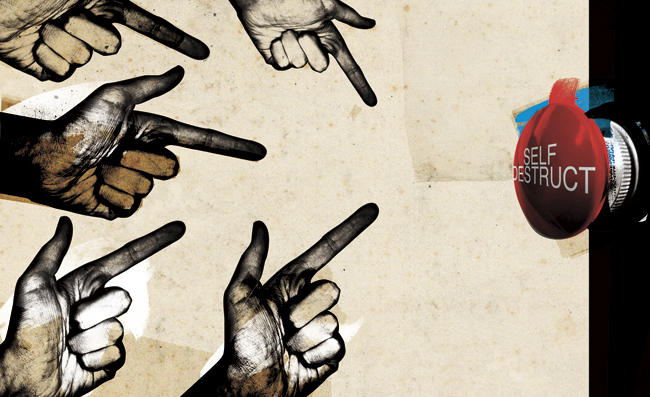In response to the LDP's decision to convene a closed-door gathering Tuesday that will enable LDP members to "exchange opinions" with Prime Minister Taro Aso, Hidenao Nakagawa demanded that the party open the event to the media.
The LDP executive dismissed his request, frankly arguing that airing the party's dirty laundry — more than it has already been aired — will have a negative impact on the party's performance in the general election.
Ichita Yamamoto defends his party's decision here, suggesting that there is little reason for the LDP to publicize what will likely be a brutal last-minute struggle between defenders and critics of the prime minister, pleasing no one but the media.
Normally I would oppose a decision to limit the transparency of the governing party, but at this point media coverage of the event would only be piling on, giving the media an opportunity for a feeding frenzy but doing nothing to inform the public. The LDP's divisions are no secret; the damage has already been done. To make Tuesday's discussion meeting public would serve only to provide the media with images of Aso being lambasted by party members. The LDP has no obligation to make such an event public and its political logic is certainly sound.
Meanwhile, Nakagawa's push to make the event public is just one more act of desperation by a once-prominent LDP member who appears to have run out of options. With the discussions occurring behind closed doors, Nakagawa's campaign to overthrow Aso will have reached its conclusion — having the public witness Aso's self-criticism session is Nakagawa's only chance to keep the flame of resistance burning.
But Nakagawa continues to insist that he will not leave the LDP, that he would rather work to reform the LDP than leave to form his own party or, given his recent tirades against the DPJ, join the DPJ. (The latest one is here.) Whether the party is interested in his efforts to reform it is another question. Takeo Kawamura, the chief cabinet secretary, said on TV Saturday that if Nakagawa and Tsutomu Takebe want to make their own manifesto, they ought to leave the LDP. Other LDP members have taken to the airwaves to remind the public that Nakagawa was the party secretary-general who was "responsible" for the 2007 upper house election. Yoshiro Mori — apparently with no modesty himself despite having come close to setting the mark for the LDP's least popular leader ever — suggested that given his "prior conviction," Nakagawa should be more modest in his speech. Tadamori Oshima similarly reminded listeners at a speech in Iwate prefecture of Nakagawa's history. This reasoning is clearly specious: Nakagawa may have resigned to take responsibility, but the idea that Nakagawa is somehow truly responsible for the party's defeat is absurd.
But I understand the criticism being directed at Nakagawa. At this point Nakagawa looks more like a saboteur than a sincere reformer. Having lost his battle to unseat the prime minister and losing the battle to influence the party's manifesto, Nakagawa would fall into line if he were sincere about staying in the party. The damage has already been done. Nakagawa has managed to demolish the illusion — such as it existed — that the LDP is capable of governing itself or Japan. "The LDP," said Naoto Kan, "is completely losing its ability to govern." The DPJ will undoubtedly be repeating this message ad nauseam until the election, making the LDP's decision to shield Tuesday's meeting from the press politically obvious: why furnish the opposition with photographic and video evidence of the party's disunity?
Meanwhile, the anti-Aso opposition is in total disarray. Seiko Noda and Yuriko Koike, leading reformists, are now fighting not just over whether to form a new party but whether Noda called upon Koike to join her in forming a new party.
However, the reformists, for all their disarray over the past three years, may have completed Junichiro Koizumi's mission of "destroying the LDP." Aso is battered (in
the Mainichi's latest poll Yukio Hatoyama enjoys 28 percent support as the most appropriate choice for prime minister, compared with only 11 percent for Aso), the party's reputation is in tatters (Mainichi has the DPJ as the party of choice for 56 percent of respondents, double the LDP's proportion), and the Yomiuri is finding that even prominent and long-serving of LDP members are having to campaign hard in their districts (a three-part series, here, here, and here ). The race may tighten up a bit as the LDP puts the Nakagawa rebellion behind it, but barring some extraordinary political financing scandal that directly implicates Hatoyama, the DPJ is likely cruising to victory. The interesting question now is just how big a victory.
Blog:
Other posts by Tobias Harris:







